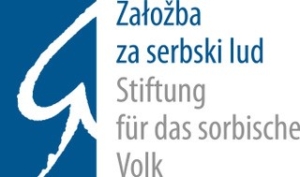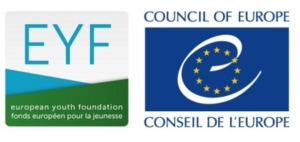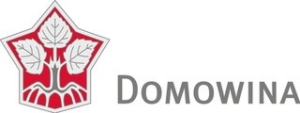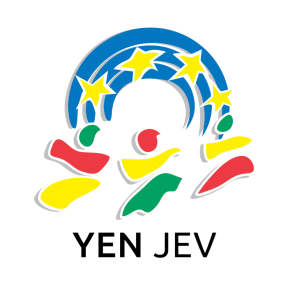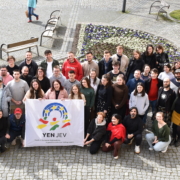YENs Easter Seminar 2024 “Know Your Rights!”
YEN‘s Easter Seminar took place in Budyšin/Bautzen, Germany, between 22nd-28th March on the theme “Know Your Rights!”. It was the second YEN event of 2024, after the first edition of the Activist Skills Training in Berlin in February. This year, the Easter Seminar was organised by YEN and Pawk e.V (Serbske młodźinske towarstwo/Youth group of the Lusatian Sorbs in Budyšin). The seminar was supported by the Council of Europe through the European Youth Foundation, by the Foundation for the Sorbian People, the Brandenburg State Parliament, the Saxon State Parliament, and the Domowina.
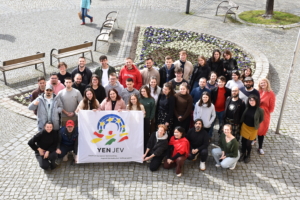
The Easter Seminar is traditionally a hub for exchange, networking and exchange of minority issues between young people all over Europe. In total, we were happy to welcome around 30 young people from all across Europe and beyond travelled to Lusatia to take part, including some new faces from the Breton and Aromanian minorities. As the second YEN event of the year on the 2024 topic of “ACTivism”, the Easter Seminar focused on the role of activism and engagement within youth organisations for autochthonous, national, ethnic and linguistic minorities. Throughout the week of workshops, participants were encouraged to discuss their different situations as minorities in Europe and beyond, put into action their demands, and to reflect on their rights.
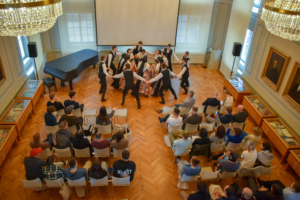
The participants arrive on Friday evening, and got to know each other through warm up games and ice breakers before their first dinner together. On Saturday the Easter Seminar officially kicked off with the grand opening ceremony in the Serbski muzej/Sorbian Museum. There were speeches from local representatives and politicians Karsten Vogt (Mayor of Bautzen), David Statnik (President of Domowina, Judith Scholze (from Domowina, and Alumni of Yen), Jan Budar (from the Foundation for the Sorbian people and Alumni of YEN) and Natalie Pawlik from (Federal Government Commissioner for Ethnic German Resettlers and National Minorities in Germany), alongside members of PAWK and the YEN board. Participants and guests were treated to wonderful traditional dances from local folklore ensemble Serbski Folklorny Ansambl WUDWOR. This was followed by a city tour in the rain, where we explored the fairytale-like Budyšin/Bautzen, before starting the teambuilding workshops in the afternoon. PAWK also organised a wonderful evening full of Sorbian music videos to entertain us with.
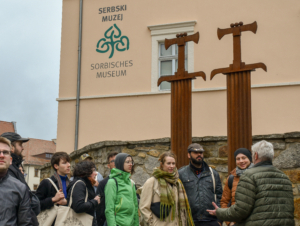
The first session of the workshop took place on Sunday on the theme of “Minority Rights are Human Rights”, where international, national and regional documents were looked at by the participants. Participants were encouraged to think about their own rights and responsibilities within democratic processes. The participants were split into two groups throughout the week, with the larger workshop group focusing on the theme “Know your rights”, in which they had their first encounters with legal documents and were able to discuss the individual legal situations of their minorities. The smaller Implementation Group aiming to provide capacity building in the theme of minority rights, with more emphasis on activist’s wellbeing, networking space and sharing ideas for actions. Our brilliant trainers Cihan Kilic, Mareike Schwartz, and Maya Doneva, and our trainer in training Mikel Aguirre Herrero led the two groups. In the evening, YEN’s famous Cultural Exchange Market took place, where participants shared songs, stories, food and drink from their minorities, and we all got the chance to find out more about each other’s organisations. It was a fun evening, and a great way to unwind after the long day.
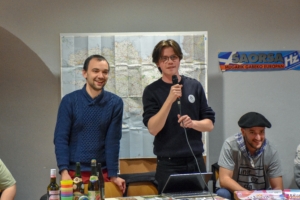
The excursion day is a great opportunity to better get to know the host community, and we enjoyed an action-packed day of exploring both Upper and Lower Lusatia (Hornja Łužica – Delnja Łužica). Beginning with a coach trip to Wielcej-juh/Welzow-Süd, we visited an open pit coal mine and were given a detailed tour by local guides, who shared stories, processes of coal mining in the region, where participants could better understand what how the mining affects the local Sorbian community. Both historically, and still today, these coal mines continue to affect the minorities here in Lusatia, and participants were shocked to see the sheer scale of the size of the mines up close.
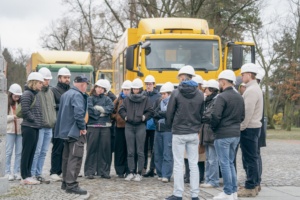
The next stop on our trip was to Cottbus/Chóśebuz, where we were honoured to listen to a talk by the wonderful Kolektiv Wakuum. With the slogan “building bridges”, this young group of Sorbian activists call themselves a queer feminist collective, and fight for the rights and revitalisation of the Sorbian language and culture in an artistic and intersectional way. They introduced many of their cultural projects, both locally and internationally, including a collaboration with the Welsh Minority. It was fascinating to hear about the attitudes between upper and lower Lusatia/Hornja Łužica – Delnja Łužica, and we learnt a lot about different ways in which minority languages and cultures can be stronger when they work together.
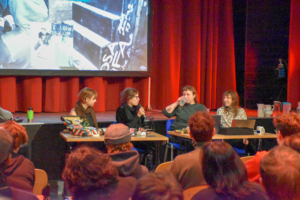 Tuesday’s workshops focused on exploring positive examples of activism, and working on how to formulate and present the demands that had been made thus far. The Implementation Group found the need and space for sharing their activist stories and situations, and finding practical solutions to local problems. After dinner, the YEN board presented some information about the Board and YEN General Assembly (GA) to the participants, who may not have taken part in a GA before, and showing them a little more about how YEN works in general. Two of our trainers Maya and Mikel also presented their human rights game, “BARABAR”, and there was space to talk about and brainstorm ideas for YEN’s partner project RISE UP.
Tuesday’s workshops focused on exploring positive examples of activism, and working on how to formulate and present the demands that had been made thus far. The Implementation Group found the need and space for sharing their activist stories and situations, and finding practical solutions to local problems. After dinner, the YEN board presented some information about the Board and YEN General Assembly (GA) to the participants, who may not have taken part in a GA before, and showing them a little more about how YEN works in general. Two of our trainers Maya and Mikel also presented their human rights game, “BARABAR”, and there was space to talk about and brainstorm ideas for YEN’s partner project RISE UP.
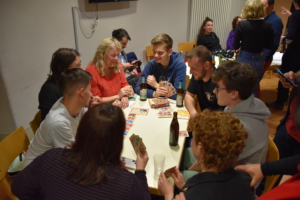
On the final full workshop day, the trainers in the main group led the participants through methods of what to do with the demands they had created/made for their minorities during the week. We were proud of our participants for their wish to deeper understand their own social and political situations, and advance their knowledge of minority rights. The Implementation Group discussed their ideas on strengthening networks and outreach, advocacy and community building, and finally presented their ideas from the week of workshops. And on that note, the Easter Seminar workshops came to an end, and participants were free to enjoy some dinner together, before an evening activity of learning about Sorbian Easter traditions. In small groups, participants got creative decorating Easter Eggs using the were decorated using the “Wachsreservetechnik”, or “Batiktechnik”, where the eggs are carefully patterned using hot wax and different colours and styles to create their own works of art or about the traditional Sorbian Easter Riding, with full costume and historical information, kindly offered again by our wonderful organisation team from PAWK.
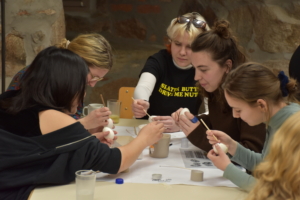
YEN’s General Assembly took place on 28th March, where interested representatives of YEN member organisations and guests stayed in Budyšin/Bautzen to take part, and many other member organisations and guests took part online. We welcomed in new Board Members, and said our goodbyes to those leaving. The final evening together was spent at the World Café, with some local Sorbian youth organisations and projects introducing their work.
We thanked and wished our hardworking hosts PAWK a wonderful Easter weekend (a few of the team stayed behind to watch the Easter Riding in person!) Overall, we were so pleased with the energy and enthusiasm of our participants, and we hope that everyone took something special away with them. Thank you to all of our hard-working participants, our fantastic host team PAWK, who ensured smooth operations throughout the week and made our trip to Budyšin/Bautzen so memorable!
We are excited to say that registrations are already open for our next event, Activist Skills Training 2 “Project Management” from 23rd-26th May – hopefully see you there 😊
Yours,
the YEN Board and Office
The seminar was supported by the Council of Europe through the European Youth Foundation, by the Foundation for the Sorbian People, which receives annual grants from tax revenue on the basis of the budgets adopted by the German Bundestag, the Brandenburg State Parliament, the Saxon State Parliament and the Domowina.
